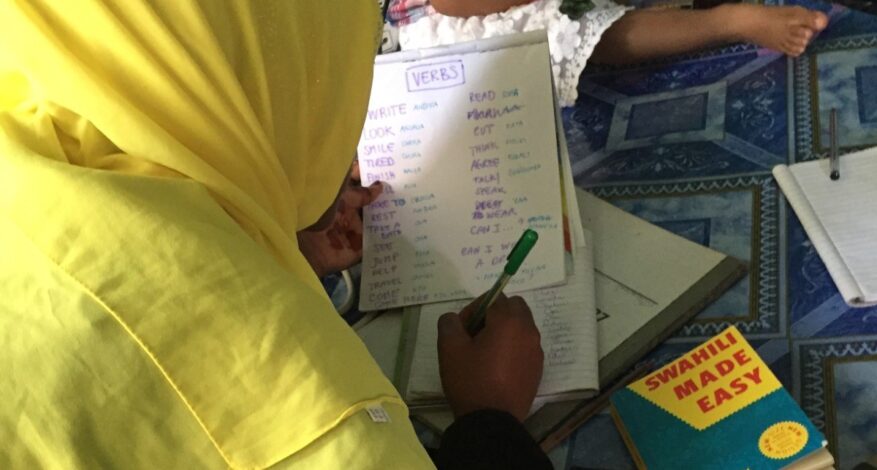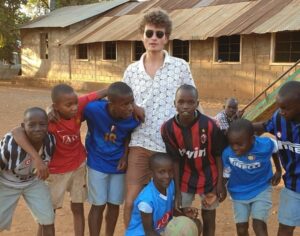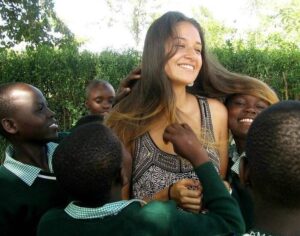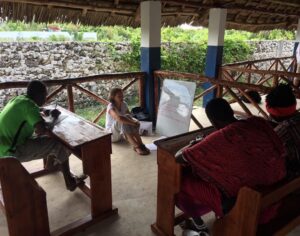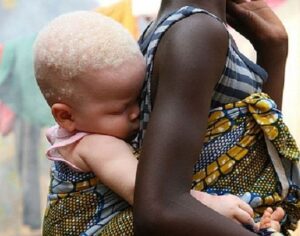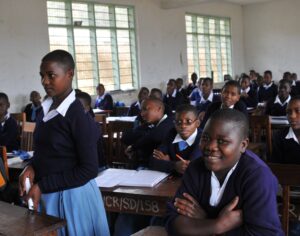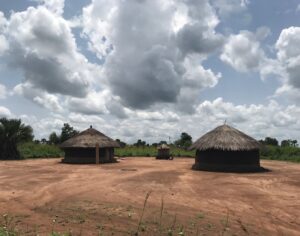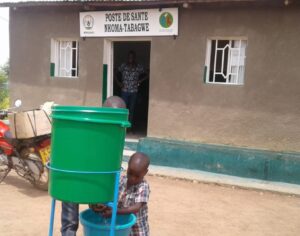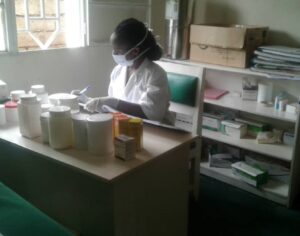ELENA’S JOURNEY THROUGH AFRICA
In 2019, Elena, a 24-year-old Italian student, started doing a Master’s degree in African Studies at the University of Copenhagen. She had always been curious about the roots of inequalities displayed on the African Continent, but, in 2017, she had a revelation when, before writing her bachelor’s thesis, she decided to join a volunteer project in Zanzibar, Tanzania.
“I left because I had a gap year and I had always thought that my career had to be connected with African dynamics. I wanted to start finding my way to approach a reality that is different from mine and to see what kind of studies to pursue. I was deeply interested in migration and gender issues. However, the only kind of experience I could do without a degree and with little work experience was volunteering. So, I chose to volunteer in Zanzibar for a project for which I had to help a group of Swahili-speaking women develops English skills. These women were running a tailoring shop, so I also helped them with tailoring activities”.
How were the environment and your relationship with those women?
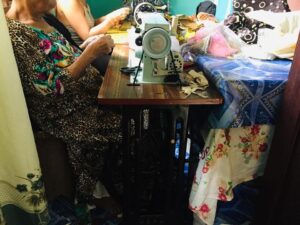 “Once I arrived, I found out that almost all these girls were very young. The oldest woman was in charge of the tailoring shop and the main goal was to train young girls with disabilities, in order to facilitate their access to the labour market. Therefore, apart from selling clothes and merchandise, the main purpose of the tailoring shop was to create a network and a working environment that would enable young girls to reach independence for their future. I left to join a community-based initiative that was already positively impacting the locals. All those women were Muslim, so it was difficult for me to understand their needs and customs at first, but, with time, we created a very strong bond. My task in the volunteering experience was to give English lessons and help manage the tailoring shop, in terms of marketing activities”.
“Once I arrived, I found out that almost all these girls were very young. The oldest woman was in charge of the tailoring shop and the main goal was to train young girls with disabilities, in order to facilitate their access to the labour market. Therefore, apart from selling clothes and merchandise, the main purpose of the tailoring shop was to create a network and a working environment that would enable young girls to reach independence for their future. I left to join a community-based initiative that was already positively impacting the locals. All those women were Muslim, so it was difficult for me to understand their needs and customs at first, but, with time, we created a very strong bond. My task in the volunteering experience was to give English lessons and help manage the tailoring shop, in terms of marketing activities”.
What about your impression of the local culture and your relationship with it?
“I must say that, in itself, Zanzibar does not really match with the collective image we, Europeans, have of Africa. Zanzibar is 99% Muslim, it is part of Tanzania, but it is very different as an environment. In addition, the fact that it is an island with wonderful beaches makes it a very popular tourist destination. So, I wasn’t the only westerner, in fact, there were many of them. Zanzibar is a melting pot of different cultures, with large Lebanese and Syrian communities as a result of migration. You can find people from all parts of Europe and, even if the majority of the community is Muslim, there are also Christians, living together harmonically. Religious clashes don’t seem to exist.
I arrived thinking I was going to have a cultural shock, as a European, but, actually, it was the opposite because tourism brings a lot of Italians there. Then I had the feeling I was entering an international place with a lot of volunteers”.
What would you say to someone who wants to volunteer in Africa?
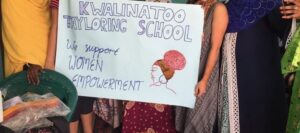 “First of all, you have to ask yourself what you want to do and why, and whether it is in line with both your interests and the ones of the locals. Looking back at my experience, I think that I could have made a more mature choice and I would have probably chosen another location in order to avoid such a touristic environment.
“First of all, you have to ask yourself what you want to do and why, and whether it is in line with both your interests and the ones of the locals. Looking back at my experience, I think that I could have made a more mature choice and I would have probably chosen another location in order to avoid such a touristic environment.
You have to understand that Africa is a very vast continent, and you should not use it as a mere experience to make your CV looking good: volunteering is a choice that must be made for other people’s sake.
So, the things you should consider are how, where, and if you can be useful with the skills you have. Indeed, I feel that the main problem with volunteering is that some people may not have the right skills to help the community in the best possible way, so this is another thing to take into account. Otherwise, you just feed the western saviour complex. I was an example of such mistake.
Talking about me, I went there to work in a tailoring shop and I’m not trained for that, I taught English to those girls without being a native speaker and without knowing Swahili.
I found myself in a highly delicate context, with many dynamics that drew me far from my comfort zone, but that I had to learn to understand and respect. I made a contribution, but I had the feeling that no continuous network was built over time. So, I realised that being a volunteer means approaching a different “ecosystem”, often having little time to learn to manage certain difficulties, with the risk of doing more harm than good.
I don’t deny that I wasn’t completely satisfied, but the overall experience increased my curiosity in what I wanted to study afterward, namely African Studies.
Anyway, it was still an incredible experience because it allowed me to get in contact with a world different from mine. But volunteering is not only a personal experience, but it is also, and above all, something you do to help a community”.
As Elena pointed out during our chat, the risk is to enhance the image of a needy continent, based on the implicit assumption that people should go and help. Before starting a volunteer experience there are important things you should ask yourself:
- How can I be helpful?
- What can I do to improve the situation?
- What does the organisation want to achieve?
- Is there a long-term project that will help the community to develop autonomous plans in turn?
- Or are we creating a system of dependency?
These questions are useful and mark the difference between Volunteering and “Voluntourism”.
That is one of the reasons that pushed Elena into starting a career based on African Studies, a master’s degree course offered by the University of Copenhagen.
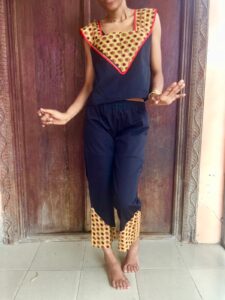 “My initial wish was to understand why there were certain problems with our way of seeing, behaving, and dealing with Africa. Two years later, the course had answered many of my questions. The most important lesson I learned is to always question my position: I come from a Western country, I am a European studying another continent, so I always have to question my point of view. I always have to keep in mind that the kind of interaction I have to establish is a partnership between equals, that I don’t have to impose my own system of knowledge but find solutions in accordance with local practices and wishes. If I had volunteered after the master’s degree, I would have done it with a different consciousness, I would not have gone to a tailor’s shop but, maybe, to a school or a university. Being aware of the context and the objective are pivotal premises to understand how to deal with Africa and with volunteering activities in this continent”.
“My initial wish was to understand why there were certain problems with our way of seeing, behaving, and dealing with Africa. Two years later, the course had answered many of my questions. The most important lesson I learned is to always question my position: I come from a Western country, I am a European studying another continent, so I always have to question my point of view. I always have to keep in mind that the kind of interaction I have to establish is a partnership between equals, that I don’t have to impose my own system of knowledge but find solutions in accordance with local practices and wishes. If I had volunteered after the master’s degree, I would have done it with a different consciousness, I would not have gone to a tailor’s shop but, maybe, to a school or a university. Being aware of the context and the objective are pivotal premises to understand how to deal with Africa and with volunteering activities in this continent”.
Volunteering is not just a personal experience; it is also a shared opportunity to grow mutually. This means that you volunteer to help a community, but the community helps you back. This is the sort of interaction that has to shape any volunteering project.

